Do you imagine living in a place where the people are warm, the beaches are pristine, and the pace of life is unhurried?
Let me introduce you to Uruguay, a country that could be the perfect destination for your retirement or next expatriate travel adventure.
Secure Peace of Mind with Best-Value International Health Coverage
International Citizens Insurance provide free, no-obligation quotes from the leading international health insurance providers with plans tailored to meet your needs. Trusted by thousands of expats worldwide.
Uruguay, the jewel of South America, is a small country nestled between Argentina and Brazil. It is a haven of tranquility with a dramatic Atlantic coastline, rolling countryside, and vibrant cities.
But what about this hidden gem makes it so appealing for retirees and expats? Let's take a look!
In this guide:
- Uruguay's highlights.
- Brief overview: geography, culture, climate, etc.
- The legalities of moving to Uruguay: visas and residency options.
- The cost of living: monthly expenses, rentals, and real estate.
- Uruguay as a retirement destination.
- Buying real estate.
- Healthcare and education.
- Where to live in Uruguay – an overview of the most popular expat locations.
- Socializing and making friends.
- Culture and lifestyle.
Uruguay's highlights
For starters, Uruguay is a modern democratic country noted for its high standard of living, excellent healthcare, and robust economy.
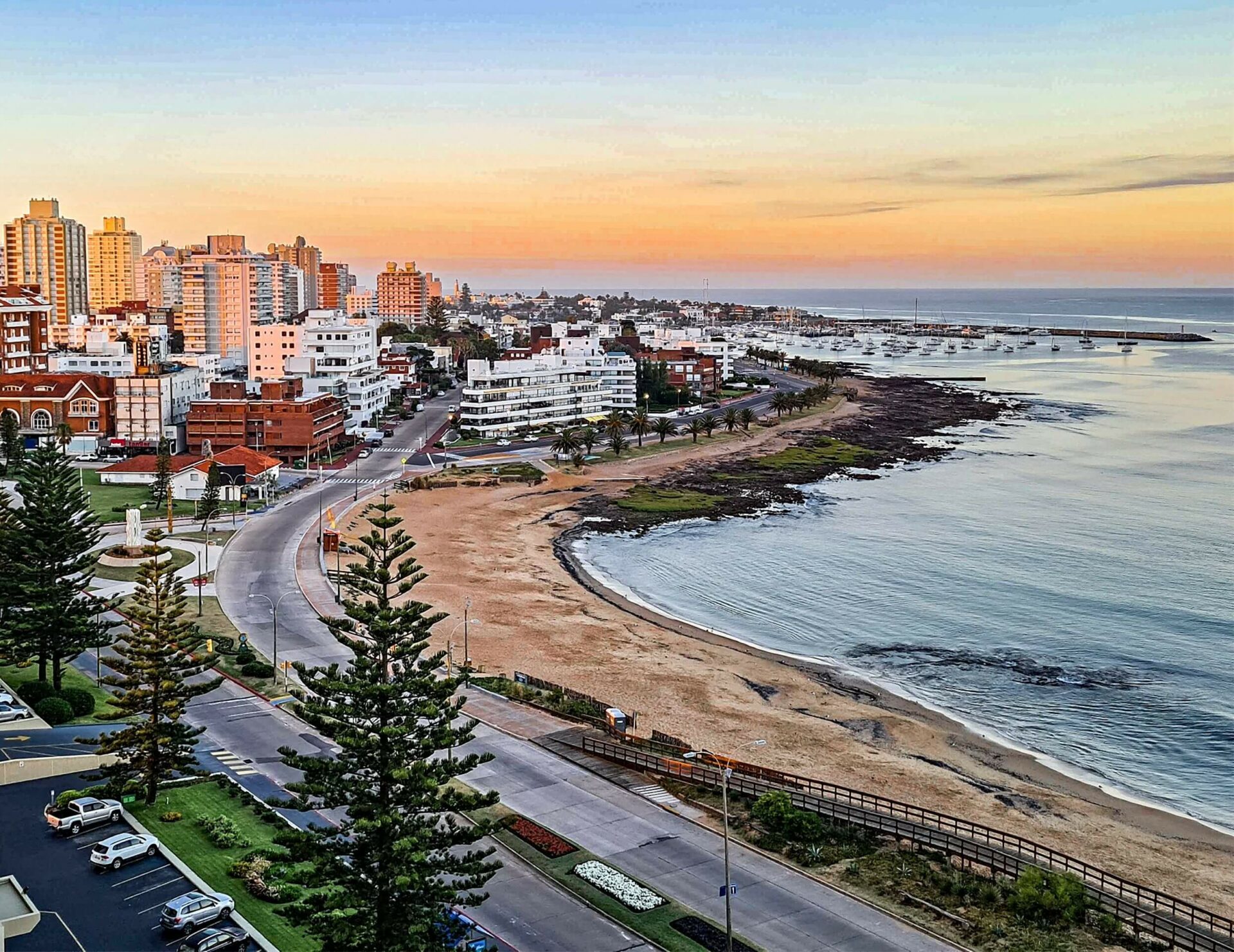
Uruguay values peace, security, and stability. The country that's been dubbed the "Switzerland of South America."
This is what you can count on if you choose Uruguay to be your home abroad:
- Lower cost of living: housing, transportation, and healthcare are cheaper compared to the North American and Northern European countries. However, Uruguay is one of Latin America's most expensive countries, and groceries, clothing, and electronics are quite pricey.
- Attractive taxation: most expats can qualify for a 10-year-long rax holiday in Uruguay.
- Historical charm: The country's capital, Montevideo, is a city steeped in history with beautifully preserved 18th-century buildings and a captivating cultural heritage.
- Culinary delights: From the mouth-watering steaks to the fine wines, get ready to indulge your senses in a culinary journey you'll never forget.
- Outdoor activities: Uruguay boasts a host of outdoor activities, from horse riding in the dramatic countryside to surfing on the wild Atlantic coast or bird watching in the serene wetlands.
As with any move, there are practicalities to consider.
In the following sections, we will delve into the nuts and bolts of relocating to Uruguay, covering everything from residency and healthcare to housing and cost of living.
Visas and residency requirements for expats and retirees
Let's get right down to it. What types of visas are available for aspiring residents of Uruguay?
Temporary visas
Tourist visa
This is the most basic type of visa, allowing a stay of up to 90 days.
While you can't work with this visa, it's perfect if you want to explore this South American gem before making a long-term commitment. It is also a great option if you have a second home in Uruguay and only want to stay there for part-time.
UK, US, Canadian, European, and many other nationals do not need to apply for a tourist visa.
You can extend your visa for up to three months. Remember to apply for an extension at the immigration office before your current visa expires.
Temporary residency visa
Temporary residency in Uruguay is for people who come to the country for a specific purpose for a maximum of two years. It is mostly aimed at employees and foreign students.
Retirement visa
The Uruguay Retirement Visa, also known as the Uruguay Pensioner's Visa, offers several benefits and opportunities for retirees looking to settle in Uruguay. Below are some of the main features and requirements of the visa:
- Age Requirement: Applicants must be at least 45 years old.
- Pension or Income: Retirees must demonstrate a reliable source of income, such as a pension or retirement savings, with a minimum monthly income of approximately $1,500 USD. This requirement ensures that retirees can support themselves.
- Health Insurance: Applicants must provide proof of health insurance coverage for their stay in Uruguay. This is to ensure that retirees have access to necessary healthcare services during their time in the country.
- Background Check: A clean criminal record is required to obtain the retirement visa. Applicants will need to present a police clearance certificate from their home country.
- Residence in Uruguay: Once the visa is granted, retirees must reside in Uruguay for a minimum of 60 days per calendar year.
Rentier visa
The Rentier Visa allows you to establish residency in Uruguay by demonstrating financial independence without the need to work in the country. Here are the main features of the Uruguay Rentier Visa and its requirements:
- Sufficient Income: Applicants must prove a reliable, passive income source, such as pension, investments, or rental income. The income should be at least equivalent to the monthly salary of a Uruguayan national, which is currently around $1,500 USD.
- Health Insurance: Proof of international health insurance with coverage in Uruguay is usually required for the duration of the visa.
- Background Checks: Applicants must undergo background checks, including criminal record checks from their home country and any previous countries of residence.
- Residence Time: Once the visa is obtained, holders are required to spend a certain amount of time per year in Uruguay to maintain their residency status. The minimum stay requirement is usually around 60 days per year.
Investor visa
Investors have two options:
- Having a real estate investment of over $380,000 and spending at least 60 days physically present in Uruguay.
- Another option is investing a minimum of $1,600,000 in Uruguayan companies, provided the investment creates at least 15 jobs in a dependent relationship during the calendar year.
Where to apply for your chosen visa
Online: visit the official website of the Ministry of the Interior – National Directorate of Migration, create your digital ID, and complete the form.
Ensure you have all documents in PDF format to attach with the application form.
In-person: to make an appointment to submit the necessary documents and fill out the application form, you should contact the Uruguayan consulate or the nearest Offices of the National Directorate of Migration of the Ministry of the Interior based on your place of residence.
Permanent residency
If you want to change your visa from temporary to permanent, you can book an appointment with the immigration department as long as you have not been in the country for more than 180 days. You can do it in Uruguay and do not have to leave the country.
The Immigration Office's main office is in Montevideo, the capital of Uruguay. But you can find several branches in other regions of the country.
When attending your in-person interview at the Immigration Office, make sure to bring an interpreter with you if you don't speak Spanish. If your application is accepted, you will receive a temporary cedula (Uruguayan I.D. card).
You can now start your life in Uruguay.
The government will review your Permanent Residency application within 24 months. Upon final approval, you will receive your Permanent Residency card and permanent cedula.
As a permanent resident, you must renew your Uruguayan ID card every three years.
The cost of living in Uruguay
Although Uruguay is not that cheap compared to its Latin American neighbors, the cost of living here is still lower than in the USA, UK, or Canada.
Here's how the country compares to some Northern European and North American countries:
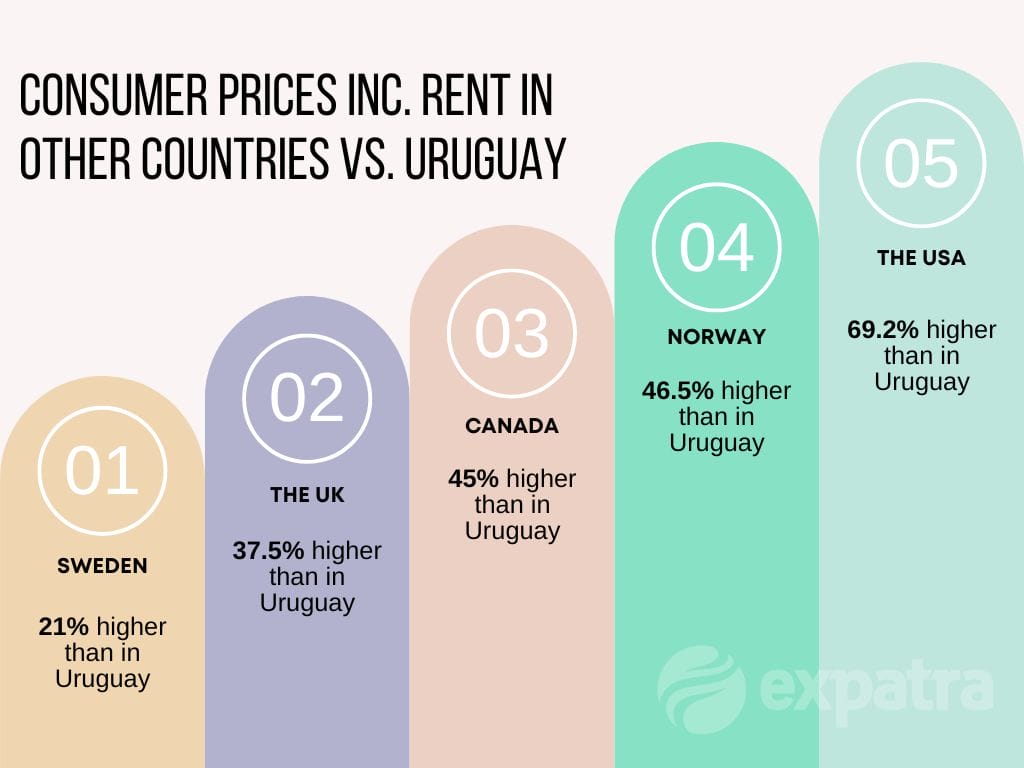
Accommodation
Whether you're leaning towards an urban apartment in bustling Montevideo or a quaint sea-view home in picturesque Punta del Este, your choice of accommodation will vastly influence your living expenses.
Here's the average rental costs in the top 5 locations in Uruguay:
| City | Average rent (USD) |
|---|---|
| Montevideo | $1,200 |
| Punta del Este | $1,400 |
| Colonia del Sacramento | $1,200 |
| Salto | $1,100 |
| Ciudad de la Costa | $950 |
Buying property?
A square meter in the city center averages $3,000; venture further afield, and it drops to around $2,200.
Food and dining
A meal at an inexpensive restaurant may cost around $15, while a three-course meal for two at a mid-range place might set you back about $60.
Groceries are fairly reasonable, too; you can expect to spend around $280 to $400 per month.
Transportation
Public transportation in Uruguay is not only efficient but also very economical.
A monthly pass costs around $50. Should you prefer the convenience of a car, gasoline prices hover around $2.20 per liter.
Healthcare
The Uruguayan healthcare system is lauded for its quality and affordability. The cost of health insurance varies based on coverage, but expect to pay around $150 per month.
A doctor's visits typically cost between $50 and $75.
Leisure and entertainment costs
A fitness club monthly fee is about $50, a cinema ticket is around $10, and the price of a cappuccino in a downtown café is roughly $5.00.
Remember, these are average costs; your lifestyle choices and personal needs will influence your monthly expenses. A comfortable life in Uruguay can be enjoyed for around $2,200 to $2,800 per month.
Your decision to pack your bags for Uruguay shouldn't be focused on living as cheaply as possible.
It's about the promise of a richer life, the allure of a passionate culture, and the call of new possibilities.
Uruguay as a retirement destination
According to the Expatra Global Retirement Index, Uruguay is one of the best countries to retire abroad.
The index is based on the Expatra Global Retirement Survey that asks international retirees to rate their retirement destination’s infrastructure, climate, ease of settling down, value for money, friendliness, and other aspects of life in their retirement destination.
Here's how Uruguay scores:
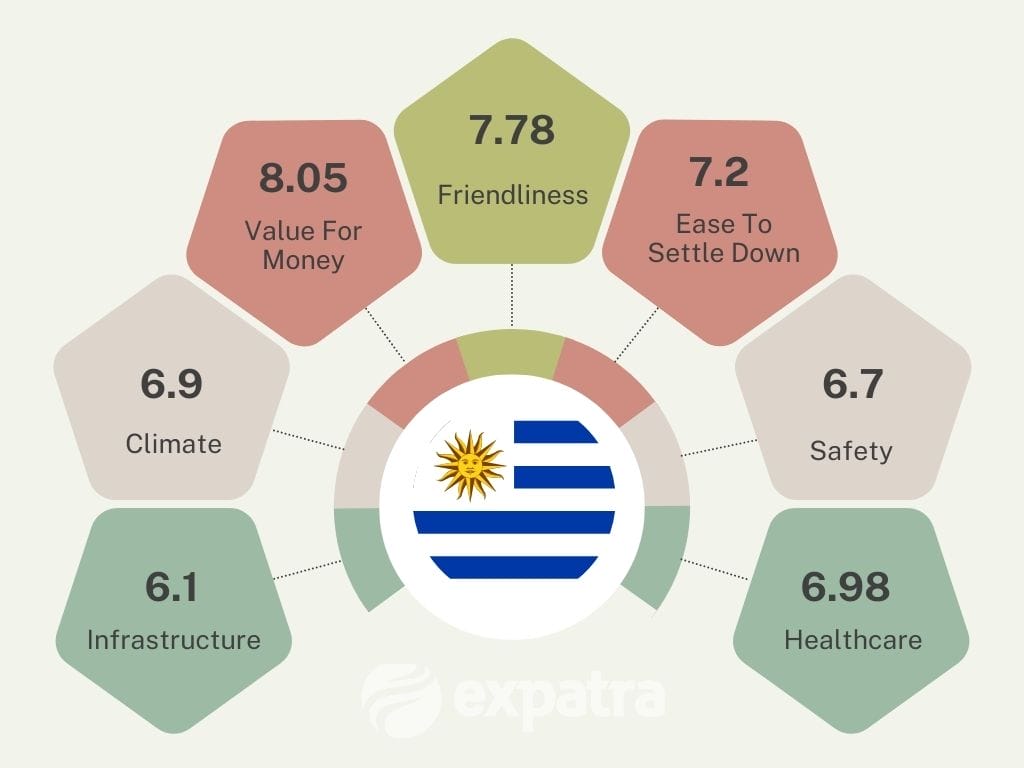
Highlights:
- Affordable visa options
- Permanent residency within two years
- Easy-to-obtain citizenship
- Zero tax on foreign pensions
Taxes in Uruguay
Moving to Uruguay as an expat has tax benefits. To get these benefits, you need to be a tax resident by spending more than 183 days per year in the country.
As a tax resident, you will have a tax holiday for 10 years. This means you won't have to pay tax on your foreign income during this time. After this period, you will be taxed at a rate of 12% on two types of foreign income: interests and dividends. However, other types of income, such as retirement, capital gains, and lease income, will not be taxed.
Alternatively, Uruguayan tax residents can choose for their foreign income to be taxed at a flat rate of 7% during their entire tax residency.
Uruguay's geography and climate
Despite its size, this gem of a country is a cornucopia of varied landscapes.
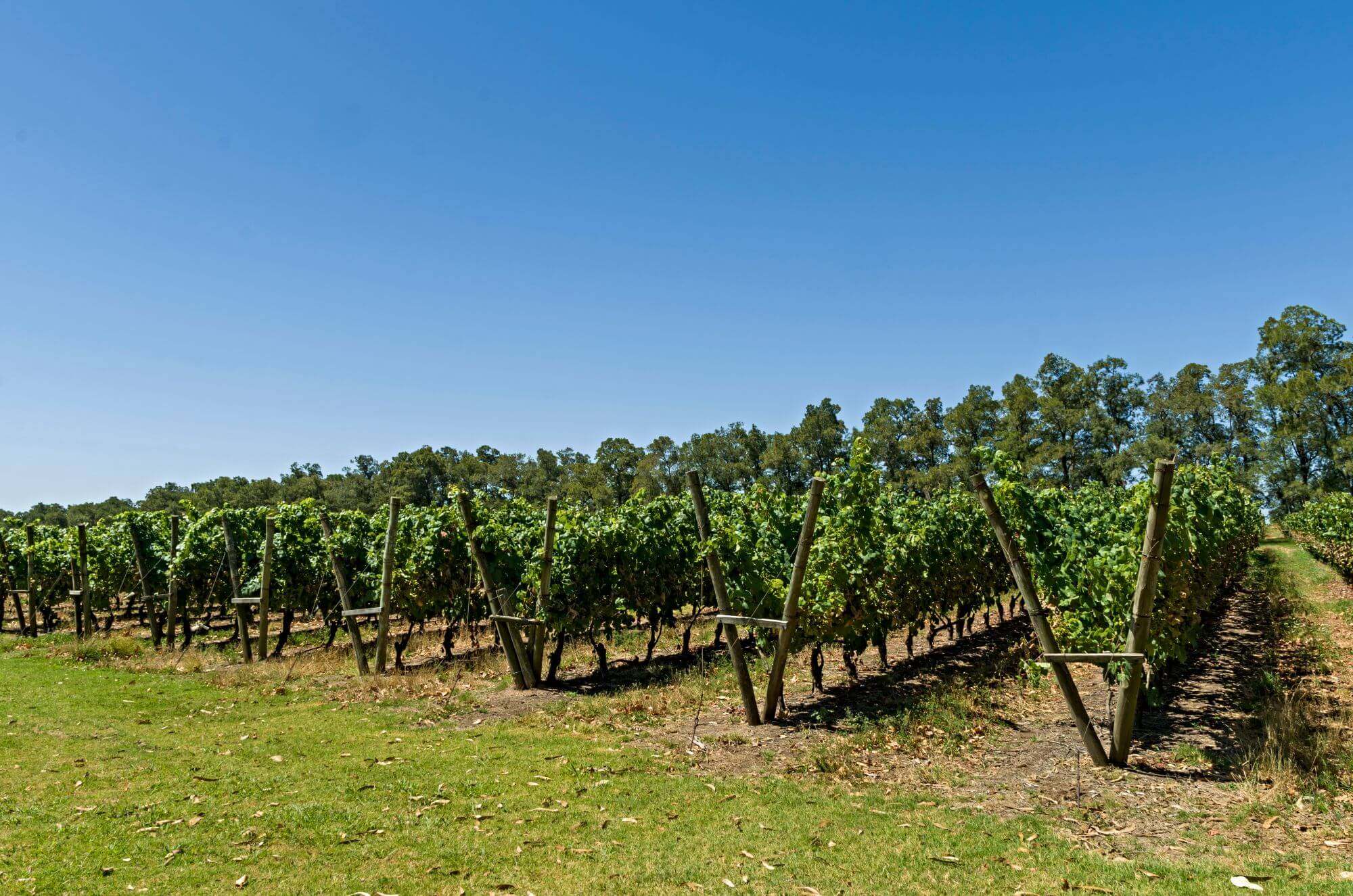
From the fertile plains of the interior, known as the Pampas, to the hilly northern regions, the terrain here is as diverse as it is alluring.
Uruguay's coastline, a marvelous stretch extending over 660 kilometers, is a delightful mix of tranquil beaches, rocky cliffs, and bustling port cities.
Uruguay boasts a temperate climate that's a dream come true for those of us who detest extremes.
- Summer (December to March): The average temperature ranges from 20°C to 28°C (68°F-82°F). It's the perfect weather for a dip in the Atlantic or a leisurely stroll along the beach.
- Autumn (March to June) and Spring (September to December): The transitional seasons of autumn and spring offer temperatures from 10°C to 20°C (50°F-68°F). These periods are marked by their mildness, ideal for exploring the city or indulging in outdoor activities.
- Winter (June to September): Winter months see temperatures between 6°C and 15°C (43°F-59°F). While it can get chilly, it's usually a far cry from the harsh winters experienced in many parts of the US and UK.
In the words of the Uruguayan poet Juan Zorrilla de San Martín: "Uruguay is small in size, but large in spirit."
the Uruguayan poet Juan Zorrilla de San Martín
Uruguay's healthcare system: a comprehensive overview
Uruguay's healthcare system is built upon a solid foundation of public and private providers, ensuring that everyone has access to first-rate medical care.
Across the board, Uruguayan healthcare facilities are noted for their cleanliness, advanced technology, and highly qualified staff.
The public healthcare system
Uruguay's public healthcare system, fondly referred to as ASSE (Administración de los Servicios de Salud del Estado), is funded by taxes.
It is intended to provide coverage for the nation's most vulnerable individuals, including low-income earners, the elderly, and the unemployed.
Despite being a public option, the ASSE is nothing short of excellent. It operates numerous hospitals and clinics across the country, ensuring that every Uruguayan citizen or resident—regardless of their location—has access to healthcare.
High-level procedures, including surgeries and long-term treatments, are perfectly feasible within this system.
The private healthcare system
If you prefer a more personalized experience, Uruguay's private healthcare system might be the path for you.
Known as Mutualistas, these private, not-for-profit healthcare organizations offer a more personalized, expedient service—at a price, of course.
Membership to a Mutualista provides you with access to an extensive network of clinics and hospitals.
Typically, Mutualistas offer shorter wait times and a wider range of specialists than the public system.
However, keep in mind that the costs for these services are higher than the public alternative.
Expats and healthcare
Expats living in Uruguay are entitled to join either the public or private healthcare system.
Before you rush off to join a Mutualista or the ASSE, it's worth noting that there may be some restrictions.
For example, some private providers may not accept new members over a certain age or with pre-existing conditions.
It's always wise to do some research and shop around before settling on a healthcare plan. In some cases, international insurance can be a better option. To make sure you get the best value for money, compare international health insurance options from various providers to find the best deal.
Buying real estate
Foreigners are allowed to own real estate and land in Uruguay.
The country has relaxed regulations when it comes to property ownership for non-citizens. There are generally no restrictions on foreigners purchasing and owning property in Paraguay, and they have the same property rights as Paraguayan citizens.
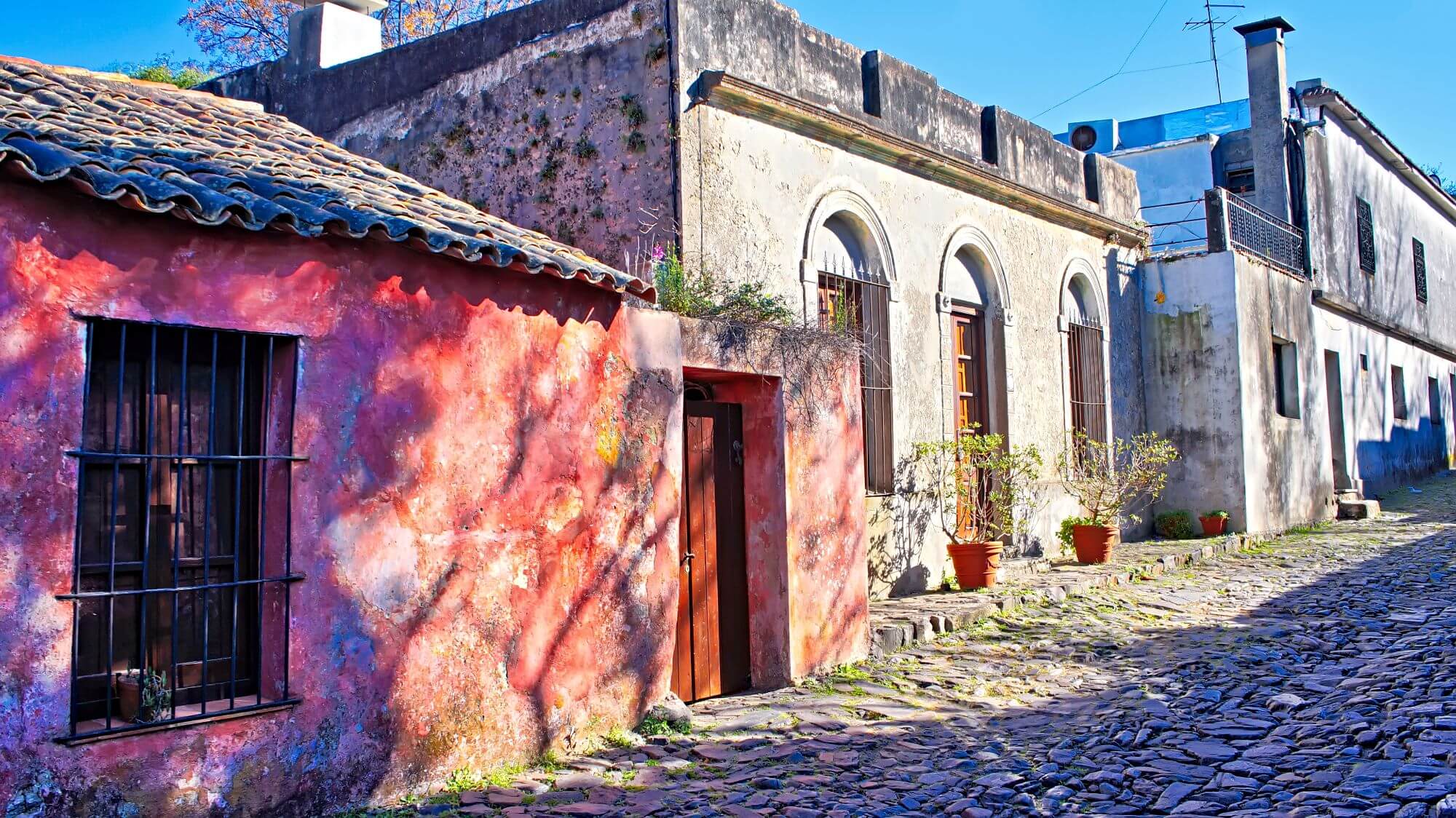
There is also no requirement to be a resident or hold a specific visa to buy property in Uruguay.
Here are the average property prices in the most popular expat locations in Uruguay:
| Location | Average property price (USD) |
|---|---|
| Montevideo | $200,000 - $400,000 |
| Punta del Este | $300,000 - $1,500,000 |
| Colonia del Sacramento | $150,000 - $350,000 |
| Ciudad de la Costa | $150,000 - $300,000 |
| Piriápolis | $100,000 - $400,000 |
| La Barra | $200,000 - $800,000 |
| Atlántida | $100,000 - $300,000 |
| La Paloma | $100,000 - $350,000 |
Education and schools in Uruguay
Uruguay's education system is divided into four main stages:
- Initial education: This stage, for children under 5 years old, is optional but highly recommended. It includes kindergartens and preschools that focus on children's initial overall development.
- Primary education: This stage spans from 6 to 11 years old and is mandatory. Here, students acquire basic literacy, numeracy, and essential life skills.
- Secondary education: This is for students aged 12 to 17. It is also compulsory and prepares students for university, technical, or vocational training.
- Tertiary education: This includes universities, technical institutes, and teacher training institutes for those who choose to pursue higher education.
International schools
If you prefer an international curriculum for your children, Uruguay can more than cater to your needs.
The country houses a number of reputable international schools, especially in the capital, Montevideo. The schools offer programs in English, as well as the International Baccalaureate (IB) curriculum.
Two leading international schools in Montevideo
- The Uruguayan American School: Follows the U.S. curriculum in Grades 9 and 10 and the International Baccalaureate program in Grades 11 & 12.
- The British Schools: Follows multiple curricula, including the International Baccalaureate program and the University of Cambridge International Examinations (CIE).
Additional support for expat students
Adjusting to a new education system can be challenging, but Uruguay provides several support systems for expat students.
Many schools offer Spanish language classes for non-native speakers, and there are also cultural integration programs to help students adapt to their new environment.
Your children's education will be in good hands in Uruguay.
Transportation in Uruguay: how to get around
From buses to bikes, taxis to trains, Uruguay offers a myriad of options to help you get around the country.
Buses
When in Rome, do as the Romans do. In Uruguay, the locals are fond of buses, the most popular mode of transportation.
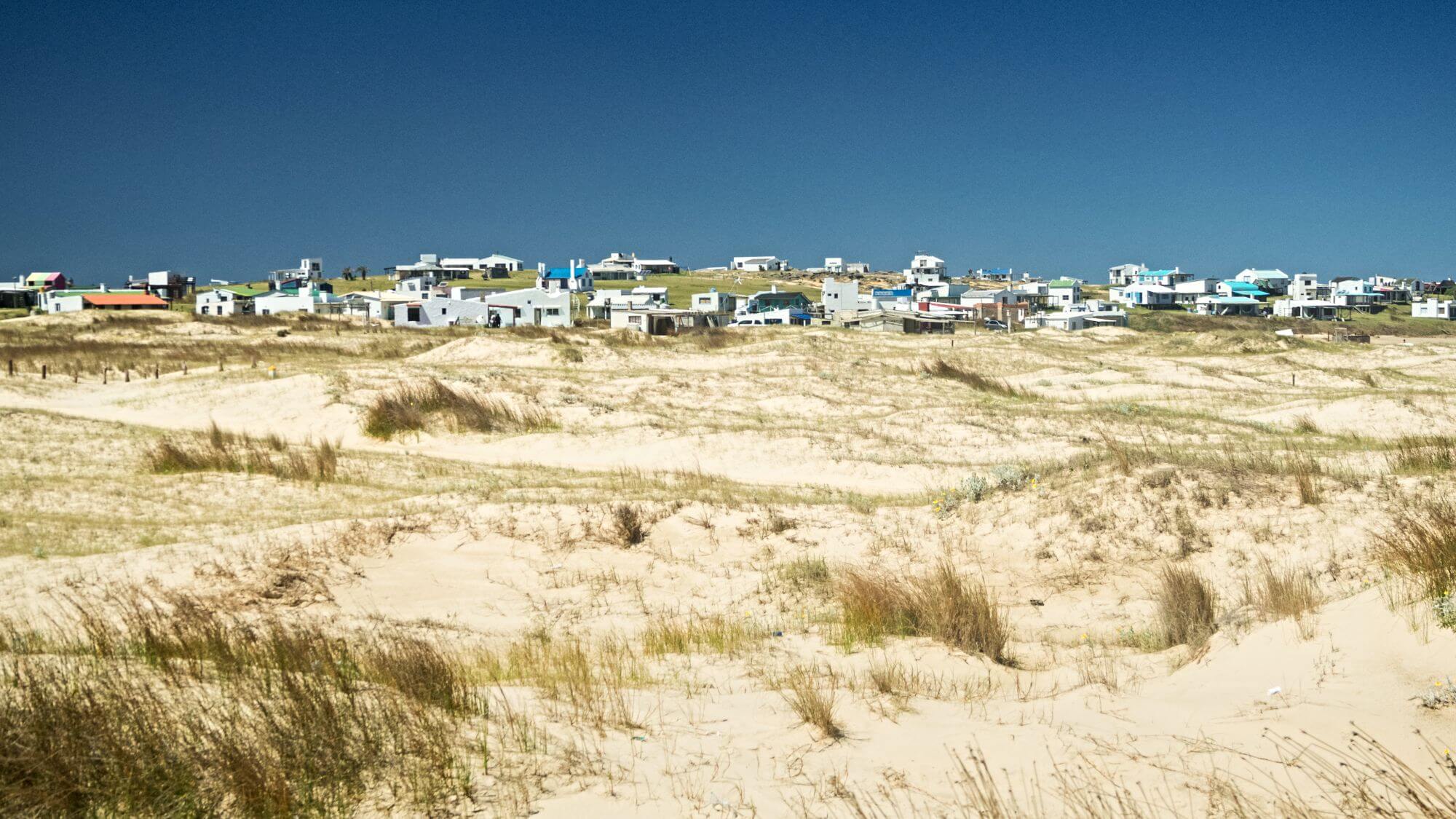
With an extensive network covering almost every corner of the country, running from early morning until late at night, they will take you wherever you want to go.
- Inter-city buses: These deliver you from one city to another around the country. They are affordable and usually quite comfortable.
- City buses: Operating within cities, these are your best bet for getting around quite swiftly. They are frequent, reliable, and cheap.
Taxis & ride-sharing services
If you prefer a more private mode of transportation, taxis are readily available in all urban areas.
Furthermore, ride-sharing services such as Uber are also operational in Uruguay. They offer a higher level of comfort and can be conveniently booked via smartphone apps.
Trains
While trains in Uruguay are not as popular as buses, they still serve a significant role in transportation, particularly for long-distance travel.
Offering scenic views of the landscape, train rides can be a delightful adventure in themselves.
Biking
Did you know that Uruguay is renowned as one of the most bike-friendly countries in South America?
Many cities, including the capital, Montevideo, have dedicated bike lanes, making cycling a safe and enjoyable experience.
Plus, it's a healthy and environmentally friendly alternative! So, why not embrace the Uruguayan way of life and pedal your way around?
Uruguay's cuisine: a culinary delight for foodies
Uruguay's cuisine, an enchanting blend of traditions, is a gastronomic treasure trove yet to be discovered by many - a melting pot of Spanish, Italian, and indigenous influences, which have all left an indelible mark on this South American nation's culinary landscape.
The staples
Uruguay's culinary scene is characterized by hearty meals, with beef being a prominent staple.
It's no surprise, given Uruguay has more cattle than people!
But the culinary delights of Uruguay are not limited to meat alone; dairy products, fresh fruits, and vegetables also play a significant role.
- Asado: The king of Uruguayan barbecues, Asado, is a must-try. Imagine succulent, char-grilled beef ribs prepared to perfection over an open flame.
- Chivito: The national dish of Uruguay, Chivito is a heavenly sandwich stacked with layers of beefsteak, mozzarella, tomatoes, mayonnaise, and often a slice of ham and a fried egg.
- Pascualina: This traditional spinach and egg pie of Italian origin is a popular choice for Lent and Easter but can be enjoyed year-round.
Uruguay's sweet treats
The country's sweets and desserts are just as diverse and delightful as its savory dishes.
- Dulce de Leche: This sweet caramel-like sauce is a beloved treat throughout Uruguay and is used in everything from cakes to ice creams.
- Chajá: Named after a local bird, Chajá is a delightful sponge cake filled with whipped cream, peaches, and meringue.
- Alfajores: These delightful sandwich cookies filled with Dulce de Leche and covered in chocolate are irresistible.
Drinks to savor
Once you've savored the food, it's time to wash it down with one of Uruguay's distinct beverages.
- Mate: More than a drink, mate (pronounced MAH-teh) is a social ritual. This traditional, caffeine-rich beverage is shared among friends and family in a communal setting.
- Tannat Wine: Uruguay's signature wine, Tannat, is a robust, full-bodied red that is an absolute delight for wine connoisseurs.
- Clericó: A refreshing summer drink, Clericó is a mix of chopped fruits and white wine – a perfect accompaniment to a hot summer's day.
Socializing and making friends in Uruguay: tips and advice
So, you've taken the leap and have decided to call the picturesque scenery of Uruguay your new home. But what's a new home without the joy of companionship, the laughter of friends, and the warmth of community?
Making friends in a foreign land can seem like a daunting task, but in reality, it's just about embracing the culture, understanding the people, and stepping outside your comfort zone.
Understanding the Uruguayan culture
The first step to making friends is understanding the culture.
Remember, Uruguay is a place where friendship is not taken lightly; it's cherished, treasured, and cultivated.
Where does this respect for camaraderie come from, you might ask?
It stems from their deep-rooted Latin American culture that values family, hospitality, and generosity.
How to make friends in Uruguay
- Join Local Clubs and Groups: Uruguay offers a plethora of social clubs, sports teams, and hobby groups. Participating in these activities not only helps you connect with locals but also gives you an authentic taste of the Uruguayan way of life.
- Learn Spanish: While many Uruguayans speak English, learning Spanish can help establish deeper connections. It's a token of respect for their culture, and it shows that you're eager to immerse yourself in their world.
- Embrace the Mate Culture: The traditional drink of Uruguay, mate (pronounced MAH-tey), is more than just a beverage; it's a social ritual. Sharing a mate often leads to hours-long conversations, creating the perfect setting for nurturing friendships.
- Be Open and Friendly: Uruguayans are known for their warm and welcoming nature. Return their kindness with an open heart and friendly demeanor. A simple "Hola! ¿Cómo estás?" can open the door to lasting friendships.
Remember, making friends is not a one-time task; it's a journey.
So, embark on this beautiful journey of friendship in Uruguay, and let your new home become a hub of warm smiles, hearty laughter, and shared stories.
Where to live in Uruguay: exploring the prime destinations
Here, we'll explore some of the must-see places in Uruguay—the ones that make the pulse quicken and the eyes sparkle with anticipation!
Montevideo: the heart of Uruguay
First on our list is the vibrant city of Montevideo, the nation's capital.
With its sprawling plazas, historical monuments, and thriving nightlife, Montevideo is the heart of Uruguay.
If you're seeking a blend of the old and new, there's no better place to explore than Ciudad Vieja.
Ciudad Vieja (Montevideo): the meeting point of the past and present
The 'Old City', as it's aptly named, is a treasure trove for history enthusiasts and modern-day explorers alike.
It's a place where you'll find Montevideo’s antique charm coexisting with its contemporary inclinations.
You won't just stumble upon remnants from the colonial era; you'll also witness how these historic artifacts seamlessly merge with the vitality of Uruguay today.
- History: At every corner, Ciudad Vieja makes you time travel with its historical monuments and centuries-old structures.
- Spirit: Despite its name, Ciudad Vieja is far from old and dull. It's lively and bustling with cafes, shops, and markets.
While much of Montevideo is equally enchanting, there's no denying that the Old City will hold a special place in your heart.
Punta del Este: the Riviera of South America
Imagine a city by the sea, where the sun sets enchantingly over shimmering turquoise waters. Enter Punta del Este. It is often dubbed as the 'Riviera of South America' for its unparalleled charm and glamour.
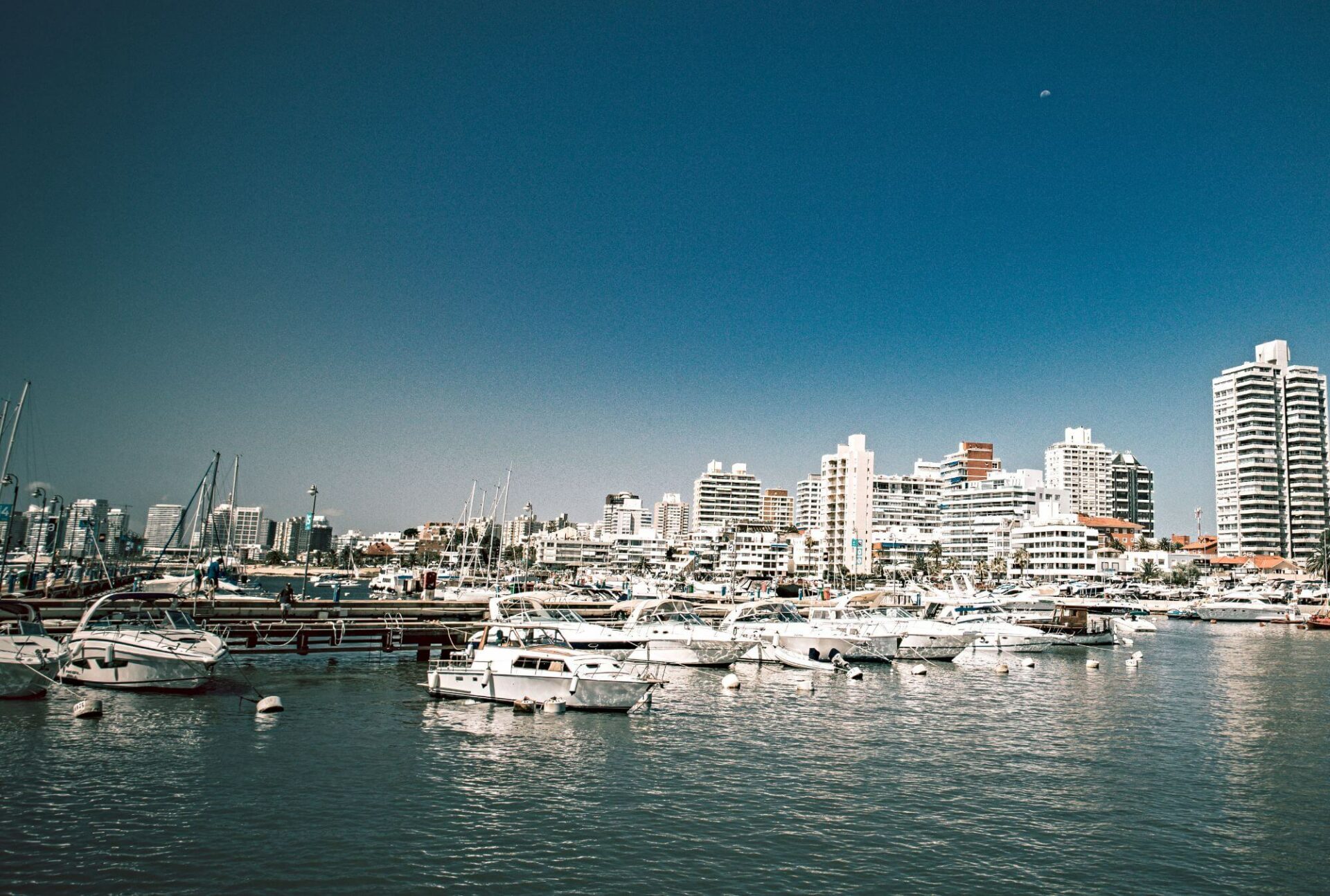
- With sandy beaches stretching as far as the eye can see. The 'Playa Mansa' and 'Playa Brava' are two of the city’s most iconic beaches that cater to all tastes, offering a mix of tranquil waters and high-surf waves, respectively.
- Punta del Este is not just about picturesque scenery; it also embraces a robust cultural scene. The city is home to 'Casa Pueblo,' a sprawling mansion and art gallery combined, offering a surreal experience to its visitors.
- Punta del Este offers delectable cuisine ranging from traditional Uruguayan fare to international flavors, with seafood as the top specialty.
Colonia del Sacramento: a step back in time
A town of cobblestone streets lined with vintage cars and colonial-era homes. Colonia del Sacramento is a UNESCO World Heritage site that transports you back to the 17th century.
Often referred to as simply 'Colonia,' this quaint town boasts of a rich past, and its charming, rustic beauty has a way of capturing your heart.
Salto: nature's playground
Salto, known for its hot springs and the mesmerizing Salto Grande Waterfall, is our next stop.
Nestled on the banks of the Uruguay River, this city is a haven for nature enthusiasts. And who can resist the call of the wild, the allure of untamed beauty?
Rocha: a wild coastline
Finally, there's Rocha, a region that promises an unspoiled coastline and diverse wildlife.
Here, you can witness sea turtles nesting on the beach or marvel at the sight of flamingos taking flight at Laguna de Castillos.
From busy cities to tranquil beaches, from historical havens to nature's own playgrounds, Uruguay has something for everyone.
You will find more information in our guide to the best places to live in Uruguay for expats.
Learning Spanish in Uruguay: opportunities and resources
Are you thinking of moving to Uruguay but struggling with the Spanish language? Fear not, my friend.
Uruguay offers a range of resources, schools, and programs dedicated to helping you become confident in speaking Spanish.
Language schools
Uruguay is home to a host of language schools, not only linguistic classrooms but also cultural immersion centers where you can learn about the rich history and vibrant traditions of Uruguay.
- Academia Uruguay: An esteemed institution with a mix of group classes and private tutorials that cater to your specific needs and pace. They also offer cultural activities that will immerse you in the local scene like a true Uruguayo.
- La Herradura: With branches in Montevideo and Punta Del Este, this school is known for its amiable staff and interactive teaching methods. They offer homestay programs for full cultural immersion - how's that for a language learning experience?
Online learning platforms
Can't wait to start your Spanish learning journey? Here are some dependable online platforms to get you started right from home:
- Duolingo: This free app offers engaging Spanish lessons you can take anywhere, anytime.
- Rosetta Stone: A more comprehensive platform with a unique, immersive method. While it comes with a price, the investment is worth it.
- Babbel: Well-structured courses aimed at conversational Spanish, ideal for those planning to move to Uruguay.
Language exchange programs
Perhaps the most enjoyable way to learn Spanish is through language exchange programs. It is a fantastic opportunity to meet locals, expats, and fellow languages. learners
Platforms such as Tandem and HelloTalk connect you with native Spanish speakers, enabling you to practice and learn in a relaxed, social context.
Why not make a few Uruguayan friends before you even set foot in the country?
Embrace the tranquil pace of life
Do you yearn for a slower pace of life, where relaxation and recreation take precedence over rushing and racing?
Welcome to Uruguay!
As an expat or retiree, you'll find Uruguayans' laid-back lifestyle a breath of fresh air.
Whether it's a lazy afternoon siesta, a leisurely stroll along the beach, or a relaxed meal with loved ones, the people here truly know how to unwind.
And who could blame them?
In a place as beautiful as this, it seems only natural to take a step back, slow down, and bask in the beauty that surrounds you.
Experience the vibrant culture
Uruguay's culture is a dynamic blend of indigenous, Spanish, Italian, and African influences, making it a delightful cultural melting pot.
With a rich history of music, dance, and folklore, it's hard not to be swept up in the rhythm of this fascinating country.
Tango, anyone?
"Uruguay is not just a place, it's a rhythm, it's a dance; it's a song that comes from the heart and is played out in the most beautiful of landscapes."
Indulge in gastronomic delights
Uruguay's cuisine is a gastronomic extravaganza!
From the famed asado (barbecued meat) to the hearty chivito (steak sandwich), the food here is soul-satisfying.
And who can forget the national drink, yerba mate?

Shared among friends and family, this traditional beverage is a symbol of hospitality and camaraderie.
Connect with warm, hospitable people
There's a saying in Uruguay, "Mi casa es tu casa" - My house is your house.
Welcoming and friendly, Uruguayans are renowned for their hospitality.
They're not just friendly. They're genuinely interested in getting to know you. And in this land of warm smiles and open arms, you won't just find a new home; you'll find a new family.
Uruguay's festivals and celebrations: joining the fun locally
The country's festivals and celebrations are a sight to behold, and as an expat or retiree, immersing yourself in these celebrations is a perfect way to get a taste of the local culture.
Carnival: a feast for the senses
Initiating the festival calendar, the Uruguayan Carnival kicks off in late January or early February.
It's the longest in the world, stretching over 40 days.
Imagine streets filled with vibrantly dressed dancers moving to the rhythmic beats of the Candombe, a traditional Afro-Uruguayan music style.
It is an event not to be missed.
Holy Week: a blend of tradition and religion
Arriving in late March or early April, Holy Week or Semana Santa is a blend of religious solemnity and cultural festivity.
With processions, traditional foods, and plenty of social gatherings, it is a time for quiet reflection, as well as community celebration.
La Noche de la Nostalgia: a night to remember
A unique Uruguayan event, La Noche de la Nostalgia on August 24th, is a night dedicated to music from the past.
Sway to the nostalgic tunes from the '60s, '70s and '80s.
It's an evening where the nation collectively reminisces and dances the night away.
Patria Gaucha: the cowboy festival
For those seeking an authentic taste of Uruguayan rural life, Patria Gaucha, held in Tacuarembó in March, is a must-attend event.
Picture this: gauchos (cowboys) showcasing their skills, horse-riding competitions, and traditional folk music filling the air.
It's quite a spectacle.
Volunteering in Uruguay: opportunities and organizations
Volunteering is perhaps one of the most rewarding ways to immerse yourself in the culture, society, and heart of Uruguay.
The myriad opportunities for volunteering in Uruguay
Uruguay has a diverse range of volunteering opportunities and has something for every altruistic soul.
Whether it's teaching English in local schools, contributing to environmental conservation, or helping out in community development projects, there's a place for you in Uruguay's volunteering scene.
- Teaching English: A universal language, English opens doors to global opportunities. In Uruguay, many local schools strive to improve their English curriculum and welcome volunteers.
- Environmental Conservation: Are you an eco-warrior at heart? Numerous organizations focus on preserving Uruguay's diverse flora and fauna. Join forces with them to safeguard Uruguay's environment.
- Community Development: For those who prefer hands-on work, community development projects offer a chance to make a tangible difference. These initiatives range from building homes to improving local infrastructure and services.
Organizations that facilitate volunteering
Now, let's talk about the bridge that connects your enthusiasm to these worthy causes - organizations that facilitate volunteering in Uruguay.
These organizations provide the necessary support, orientation, and sometimes accommodation to ensure an exceptional volunteering experience.
Here are a few:
- AIESEC: This international platform offers volunteering and internship opportunities across numerous sectors, including education and community development.
- Projects Abroad: Known for their global outreach, they offer diverse volunteering opportunities in Uruguay, including conservation and human rights initiatives.
Remember, volunteering is more than work; it's a chance to make a difference, learn, and grow.
In conclusion
In conclusion, Uruguay offers an enticing haven for expats and retirees with its stable economics, high living standards, and welcoming culture.
This charming country epitomizes a relaxed lifestyle with its laid-back cities, sunny beaches, and vibrant countryside; it's no wonder why so many expats already call it home.
Other countries in Latin America to consider:
- Living In Costa Rica
- Living In Panama
- Living In Mexico
- Living In Colombia
- Living In Argentina
- Living In Paraguay
- Living In Chile
You might find useful:
Helpful external links:
- Residency in Uruguay: options and steps - Uruguay government website
- Uruguay State Health Services Administration - ASSE
Secure Peace of Mind with Best-Value International Health Coverage
International Citizens Insurance provide free, no-obligation quotes from the leading international health insurance providers with plans tailored to meet your needs. Trusted by thousands of expats worldwide.







